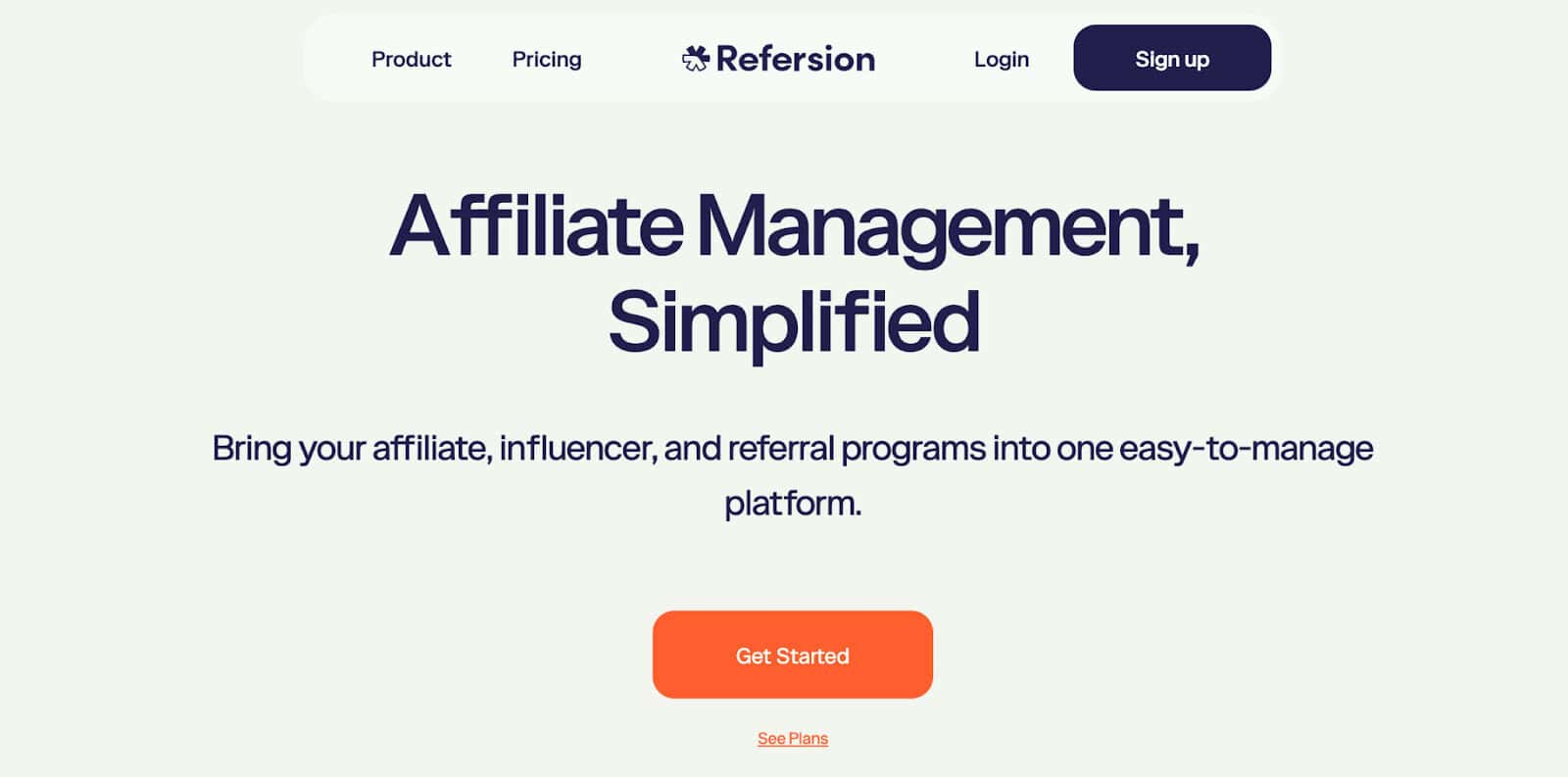Last Updated on December 30, 2025 by Ewen Finser
CAKE is a powerful and well-known platform, but it isn’t the be-all and end-all solution for every digital merchant, especially as affiliate programs are becoming more diverse and tech stacks are piling up all over the place.
Businesses need flexibility, automated workflows, and integrations that GetCAKE may or may not provide, but there are more alternatives available than ever before, and these include Everflow, PartnerStack, Affise, Refersion, and TUNE.
GetCAKE Alternatives Overview
Compare | Use Cases | Integrations | Best For |
Everflow | Multi-channel affiliate partners at scale | Shopify, WooCommerce, Stripe, CJ Affiliate, ClickFunnels, Sticky, Konnektive, ThriveCart, BuyGoods, ClickBank, Ecwid, others | Established digital merchants with good volume and internal (team) capability |
PartnerStack | Scaling partner, referral, reseller channels systematically | Salesforce, Stripe, Hubspot, Slack, Recurly, Chargebee, Pipedrive, Google Sheets, others | Mid to large B2B SaaS companies |
Affise | Scaling and custom automated workflows | Shopify, Tipalti, Salesforce, HubSpot, Pipedrive, Zapier, AnyTrack, Looker, Dynamics 365, others | Mid to large merchants, especially those in app or i-Gaming |
Refersion | Multi-channel affiliate management and growth | Shopify, WooCommerce, Magento, BigCommerce, Salesforce, Stripe, Chargebee, CartHook, Shipbob, Uscreen, others | Small businesses and affiliate beginners through large-volume companies |
TUNE | API customizations and workflow automation | Shopify, Awin, CJ, Impact, 24Metrics, Okta, Segment, Tealium, Billoid, AnyTrack, others | Enterprise-level digital merchants |
We’ll take a much closer look at what each of these CAKE alternatives provides, including their pros and cons and who they’re best for.
What To Consider While Exploring Alternatives To GetCAKE

Before we get into each of the alternatives, it’s important to evaluate the things you need or want (that CAKE might not provide as well as other platforms).
- Your program type and size: Is your program small and in-house, or is it a vast and high-volume network? You’ll want to choose a platform that can support your business where it’s at right now, but help you grow in the future, too.
- Integration needs: Keep in mind the existing tools you use (CRMs, analytics, e-commerce, etc.) and make sure that any platform you’re considering will be able to support them.
- Pricing: With great power comes high pricing (usually), so you’ll need to think about the way(s) each platform charges and what the cost is month over month, to make sure it’s in line with your budget.
- Automation support: If you already use (or plan to use) workflow automations for repetitive tasks (like payouts), choose a platform that provides those.
- Fraud detection and compliance: This is pretty common with any major affiliate platform, but built-in fraud protection and compliance checks should be standard.
- Support and onboarding: Especially if you’re new to affiliate marketing or have a complicated tech stack to deal with, if you think (or know) you’ll need heavy support and hand-held onboarding, choose a platform that’s going to provide it.
The Best Alternatives to GetCAKE, Ranked

If you’re considering CAKE alternatives right now, my list of top picks below will break everything down to help you decide which platform matches your goals, technical needs, and budget.
Everflow

As a partner marketing and affiliate platform, Everflow provides end-to-end tracking and management for multi-channel partners that include content creators, influencers, and customers-turned-ambassadors, as well as media buying, offline placements, and even recurring revenue.
Offering deep analytics and tracking with powerful integrations, you can drill down into even the most granular data to fully understand what is (or isn’t) driving the best ROI.

But what really makes Everflow stand out as the best CAKE alternative is the support. Affiliate platforms always have some kind of documentation and “helpful” FAQs, but Everflow takes the support several steps further. The onboarding process, for instance, is a mandatory four weeks that includes training, which means that when your affiliate program launches, you actually know what you’re doing and how to run it.

And the support is ongoing: If you run into trouble or have questions, you’re gonna get help. (That sounds simple, I know, but I speak from experience when I tell you that with other platforms, you might find yourself waiting days for a response.)

That said, this can be a little more costly compared to other platforms (like Refersion, which we’ll talk about later), so it’s likely a better fit for mid- to large-scale digital merchants, rather than beginning startups.
Everflow Pros
- Gives you insight into potential partners so you can find and connect to top-tier affiliates that will increase revenue and placement performance. You can filter through various partner types, like review websites, email lists, or media, to find potential affiliates.
- Everflow lets you integrate outside programs and networks to see everything in one place.
- Shopify, WooCommerce, Stripe, CJ Affiliate, ClickFunnels, Sticky, Konnektive, ThriveCart, BuyGoods, ClickBank, and Ecwid are among the current integrations.
- Offers smooth onboarding for influencers, ambassadors, and other partners with a customizable Partner Sign Up page, and also DocuSign integration for digital paperwork.
- With Extensive Dimensional Analytics, you can quickly make the best decisions by deeply analyzing data.
- QR codes can be generated from tracking links for offline marketing campaigns or partnerships.
- You can customize payment terms completely, with payout models beyond purchases or leads like CPC, CPS%, or CPA.
- Fraud prevention and monitoring are included (and ongoing).
- The four-week onboarding and training program will set you up for success, and you’ll always have access to excellent customer service and support.
Everflow Cons
- It might be a bit too complex for new businesses or smaller sellers who haven’t gained momentum yet, or those who are too busy to learn and manage it.
- Depending on your setup and needs, can be on the expensive side compared to other GetCAKE alternatives.
PartnerStack

PartnerStack is a cloud-based partner relationship management platform designed primarily for B2B SaaS companies. Like Everflow and other similar affiliate platforms for digital merchants, PartnerStack provides end-to-end support, which includes finding and recruiting partners, onboarding, tracking their activity and attribution, automating payouts and commissions, and optimizing business growth.

Their network of more than 100,000 partners provides SaaS companies with a means of connecting with affiliates, resellers, and referrals easily. Program onboarding is fully customizable, so you can provide new partners with whatever training and resources are needed (on their end) to market your product(s) effectively.
And of course, the automated payouts make administration easier each month, so you can spend valuable time focusing on traffic flows, converts, and other reporting data to track and improve your ROI.

PartnerStack integrates with Salesforce, Stripe, Hubspot, Slack, Recurly, Chargebee, Pipedrive, and Google Sheets, but custom integrations can be set up using PartnerStack API, as well.
The biggest drawback to PartnerStack, really, is the platform cost, which may be more than smaller companies or startups in early stages are in a position to handle.
PartnerStack Pros
- It’s built for B2B SaaS companies, particularly those with subscription models, making it an optimal solution for those businesses, specifically.
- Network of more than 100,000 partners (affiliates, resellers, and referrals).
- Easy, intuitive onboarding for the company, but also provides customizable onboarding for affiliate partners.
- Deep reporting, tracking, and automated payouts to affiliate partners.
PartnerStack Cons
- Is not a fit for every digital merchant, being focused on SaaS.
- Smaller companies or those still testing proof-of-concept may find it to be expensive and/or too much to start with if they’re new to affiliate marketing.
Affise

Affise is a cloud-based affiliate marketing platform that supports e-commerce, mobile apps, and i-Gaming, which makes it an especially great fit for businesses in the app or gaming spaces.

Like its competitors, Affise provides customizable dashboards and deep real-time reporting so you can monitor each partner’s clicks, conversions, revenue, and traffic sources. SmartLinks provide partner management automation and rule-based optimizations help you to streamline administrative workflows and maximize your time managing everything.

Affise uses an open API structure designed to allow seamless integrations with Shopify, HubSpot, Pipedrive, Tipalti, Zapier, and others, making it perfect for teams that rely on custom workflows.
But that also means that it can have a heavier learning curve, especially for new users. Even though Affise offers documentation and a support team, the tutorials and onboarding materials aren’t always beginner-friendly.
And this might be the writer and editor in me, but some typos on the website irked me enough to question their attention to detail.

That said, Affise is headquartered in Lithuania, and such errors are likely things lost in translation. (And, as an aside, this may be part of the reason their documentation is a little tricky to follow.)
Even so, Affise is well-loved by those who use it, once you get a feel for it.
Affise Pros
- Provides comprehensive tracking and analytics across all partners with real-time reporting.
- Offers exceptional partner marketing for mobile apps and i-Gaming.
- Integrations are flexible and plentiful with its open API structure.
- Customizations, automations, and integrations are aimed to support teams that use automated workflows.
Affise Cons
- Is primarily designed to support high-volume operations, and may be more than small digital merchants or startups really need.
- Steep learning curve with sometimes difficult-to-follow tutorials.
Refersion

Refersion is a partner marketing program that helps digital merchants to find and recruit partners, track their referrals (through links or coupon codes), manage payouts, and monitor performance from end to end. You can connect with content creators and bloggers, influencers and brand ambassadors, and even recruit happy customers for referrals.

The biggest benefit to Refersion is the easy setup and wide integration support. Especially if you’re new to affiliate marketing or you’re a smaller digital merchant, this is a really user-friendly platform to get started with.
Speaking of smaller businesses, Refersion’s “entry level” pricing (Launch) is really affordable, starting at $39 a month (if paid monthly) and just 3% of affiliate sales. As your affiliate program grows and (if) you upgrade, the monthly fee gets higher, but the sales percentage gets lower.

But therein lies the bummer: Lower-tier plans do not include API access, marketing integrations, and other features that you may want or need, like customizable commission options or multi-store management.
Even so, it’s a good entry point to affiliate marketing for newbies looking to grow and scale over time.
Refersion Pros
- Compared to its competitors, Refersion is a simpler affiliate setup with a lower learning curve.
- Pretty affordable, especially for new affiliate programs and small businesses; the smallest package is just $39 a month (plus 3% of affiliate-driven sales).
- Is a great option for merchants looking to scale ambassador programs.
Refersion Cons
- May not be as powerful as others, especially for digital merchants with enterprise-level volume.
- Payouts are one-click, but not automated.
- There is a feature gap as far as access to API and other reporting/workflow processes, depending on the tier you’re using.
TUNE

Often still known as HasOffers, TUNE is a fully customizable SaaS partner marketing platform that provides white label dashboards and interfaces that allow you to build a branded experience for your affiliate partners.
This is a feature-rich platform with strong API access and customization so you can fully tailor your dashboards, reporting, partner segments, and payout logic. You can literally “Build Anything On Our API” with more than 650 endpoints, so whatever solution you’re looking to create, you can get it done.

(Or, if you want the customization and can’t do it yourself, TUNE offers technical development and consulting services. For a price, of course.)
This is a versatile affiliate platform that’s best for enterprise-level businesses, given its complexity (and power); it might be more than a bit much for startups and small businesses. It’s nowhere near as simple and intuitive for beginners, compared to Refersion, and the help and support can be lacking unless you’re a big-time player.

That said, if you’re an enterprise-scale merchant and you want the most API customization, you’ll likely find it with TUNE.
TUNE Pros
- Robust tracking and analytics for tracking conversions and partner metrics.
- Unparalleled API access and customization.
- Global scaling and support for multiple geographies.
TUNE Cons
- It’s a complex beast of an affiliate platform, with the steepest learning curve of any getCAKE alternatives on this list.
- The UI can feel a little unintuitive.
- The cost and pricing structure is steep, so it’s best for large to enterprise-level businesses.
Closing Thoughts
Even though CAKE remains a strong and viable solution for many digital merchants, the affiliate platform space has diversified a lot in recent years.
Whether you need something simple (like Refersion), advanced analytics and automations (Everflow or Affise), want a partner ecosystem (PartnerStack), or need absolute API-driven customization for an enterprise-level business (TUNE), you’ve got plenty of options to consider.
And hopefully, by this point in the article, you’re a few steps closer to figuring out which one will support and grow your affiliate partnerships the most.

